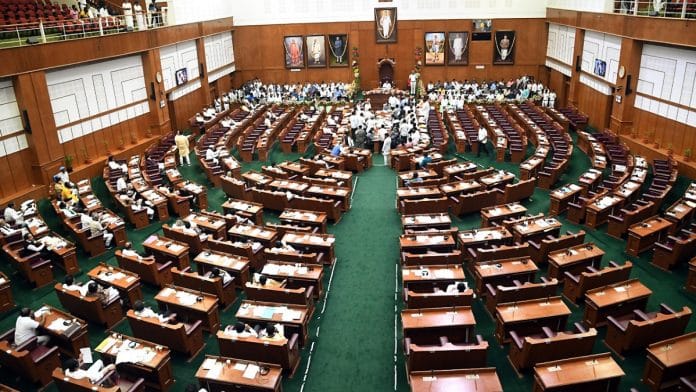Bengaluru: The Russia-Ukraine war, coupled with the Israel-Hamas conflict, has led to a state of global uncertainty, cutting off capital inflows into Karnataka, says a new report by the state government.
According to the Mid-Year Review (MYR) of Karnataka’s finances, capital inflows into the state’s startup sector saw an 82 percent drop in the first quarter of the current fiscal year, compared to last year, exacerbating the “funding winter” in one of India’s most industrious states. The state attracted $0.6 billion of Foreign Direct Investment (FDI) in the April-June quarter of the ongoing fiscal, as against $3.4 billion in the same period in FY23.
The MYR was placed before the state legislature Thursday, during the ongoing winter session.
“Due to slowdown in advanced economies, Karnataka witnessed a 46 percent decrease in FDI, dropping by $2.5 billion from $5.3 billion in the first half of FY23 to about $2.8 billion in the first half of FY24, mainly due to reduced funding for startups and a drop in FDI inflow in the IT/software sector,” the report said.
It added that the private equity and venture capital sectors have experienced a downturn on account of growing geopolitical tensions. The report cites “amplified uncertainty” caused by macroeconomic challenges and geopolitical conditions.
Priyank Kharge, Karnataka’s minister for IT, told ThePrint Friday that the impact of any slowdown in investment into startups will have the biggest impact on Bengaluru as it is the “anchor” for the sector. “If overall (startup funding) is down 70 percent and if Bengaluru has been affected by 80 percent, it shows we have the highest share,” he said.
Global trends, he added, indicate the onset of a “venture winter” as funding for startups seems to have dried up in multiple sectors. In its annual ‘India Tech 2023’ report, startup research platform Tracxn had stated: “With $7 billion in total funding received so far this year, 2023 has become the lowest-funded year in the last five years.”
In Karnataka, the downturn in capital inflows in the startup sector marks the first “funding winter” since 2017. “Startups are finding it very very difficult to raise funding in today’s time,” said a senior Karnataka government official, requesting anonymity.
Kharge said the state government is for the firs time “engaging VCs directly” in the hope that it would help iron out any issues and allow seamless inflows into the sector. “We have been trying to create more value than add to valuations,” he added.
Manufacturing resilient even as services hit
On Tuesday, state Industries Minister M.B. Patil, speaking at the 62nd State High Level Clearance Committee (SHLCC), announced that memorandums of understanding (MoUs) of projects worth Rs 34,115 crore had been signed. This, he added, would potentially create 13,000 new jobs in the state.
The SHLCC, headed by Chief Minister Siddaramaiah, approved 14 projects worth Rs 34,115 crore. Of these, 10 are new projects worth Rs 19,452.40 crore, while the remaining four are additional investments of Rs 14,662.59 crore, the government said.
Patil also clarified that the SHLCC approved Foxconn’s proposal to invest Rs 13,911 crore in Karnataka, in addition to an investment of Rs 8,000 crore for which the company has already received approval.
Madan Padaki, founder and CEO of 1Bridge and president of TiE Bengaluru, told ThePrint that it is important for governments to send out the right signals to attract more funds from within the country.
“We (stakeholders) are trying to give the right signalling to bring in Angel investors to invest alongside the already funded startups like in the Elevate programme,” said Padaki, who is also the co-founder of the startup incubator Global Alliance for Mass Entrepreneurship (GAME).
A senior government official said the decline in FDI was mostly for startups, services and not manufacturing. “Karnataka gets FDI on 2-3 fronts. Services, startups and manufacturing. Manufacturing has not been hit,” the official said.
This decline was part of a larger drop in overall FDI inflows from $5.3 billion in the first quarter of FY23 to $2.5 billion in the first quarter of FY24.
According to the MYR, FDI in IT services saw a 60 percent decline, amounting to $4 billion, in the first quarter which accounted for 23.9 percent drop in FDI.
Karnataka is among the most preferred destinations for foreign capital inflows in India and continues to attract investors from around the world. According to the state government, Bengaluru is home to India’s biggest startups, accounting for nearly half of the country’s share of “unicorns” — a startup valued at over $1 billion.
“The monsoon failure has added to the state’s woes, adversely affecting agricultural production and hydroelectricity generation,” the MYR report said. It added, “This, coupled with challenges in thermal power generation due to coal shortages and high costs, has increased the state’s dependence on renewable energy sources.”
“Despite these challenges, the state government has taken proactive measures to address the power crisis,” the report said.
It also said that the state government has “initiated power purchases from other states, increased power generation, and ensured a constant supply to meet the state’s demand”.
As ThePrint reported earlier, the Congress government’s promise of providing up to 200 units of free power, coupled with drought and acute shortage of rains, had pushed the state from a power-surplus one to having to look outside to buy electricity to meet demands.
(Edited by Amrtansh Arora)
Also Read: Unicorns are passe. Cockroach is the buzzword as funding winter chills startup sector






